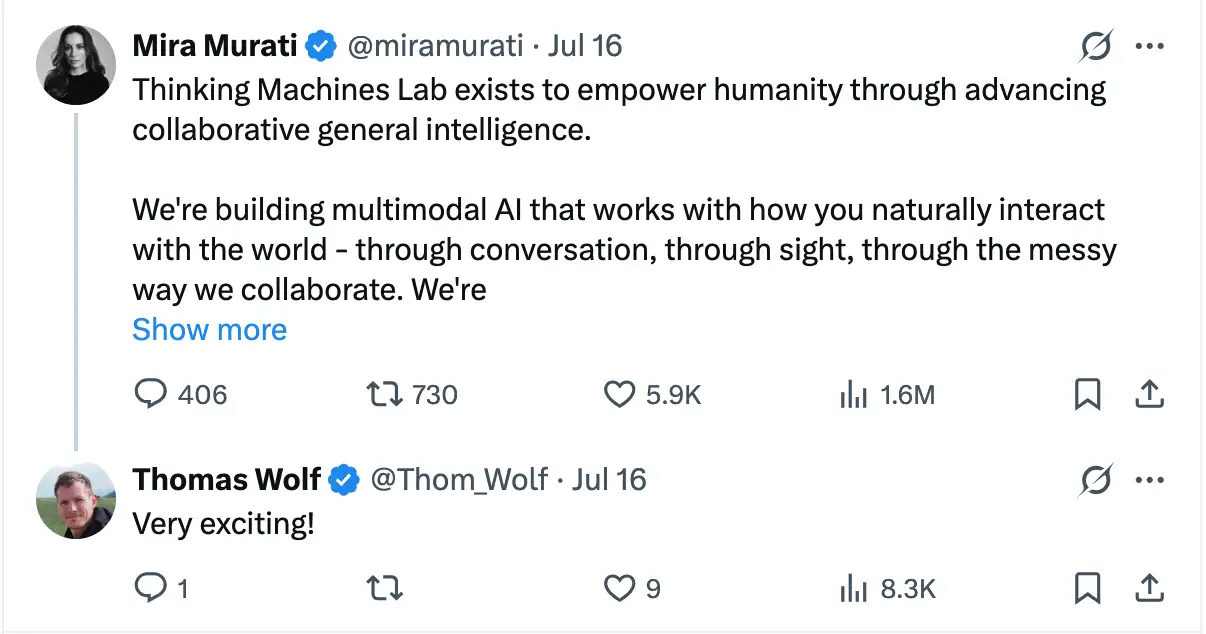OpenAI Royalty Strike Back: Billion-Dollar Brainpower, Free for All?

Vivi Carter · 22, July 2025
Silicon Valley’s New Powerhouse: Thinking Machines Lab
When Mira Murati, the former CTO of OpenAI, announced a new $2 billion funding round led by Andreessen Horowitz (a16z), it sent shockwaves through the AI and tech investment world. Her new company, Thinking Machines Lab, has only existed for five months—but it’s already boasting a sky-high $12 billion valuation and heavyweight backing from names like Nvidia, AMD, Accel, and ServiceNow.

But the real jaw-dropper isn’t just the money. Thinking Machines Lab is now gearing up to launch its very first product—a multimodal AI platform—and plans to open-source key elements from day one.
This is the kind of play that’s getting high praise in the machine learning community. Thomas Wolf, co-founder of Hugging Face, tweeted about his excitement.
The First Product: Designed for Human-Like Collaboration
While rumors about this massive funding round have been floating around for weeks, Wednesday’s official announcement made it clear: Murati and her team are aiming higher than most.
Their vision? To build “collaborative general intelligence”—AI that elevates human capability, not replaces it. The upcoming platform promises to interact naturally across languages, images, video, and more, with immersive multi-sensory collaboration as the end goal.
What makes this especially disruptive is that—from the start—some components will be open source. This isn’t just about transparency. For researchers, students, and even rival startups, it means direct access to some of the most advanced building blocks in AI today.
The company also plans to release regular research updates, deep dives, and technical documentation to help the global AI community accelerate their own work.
The A-Team: Superstars from OpenAI, Meta, and Beyond
How do you get a $12 billion valuation with no live product? Assemble a dream team.
Thinking Machines Lab has rapidly recruited not only top OpenAI talent, but leaders from other industry giants as well, including:
Barret Zoph:
Former head of OpenAI’s post-training research group, with prior deep learning experience at Google.
John Schulman:
Co-founder of OpenAI, long-time head of alignment and model fine-tuning, whose influence shaped several key ChatGPT breakthroughs.
Lilian Weng:
Led OpenAI’s safety and security research, focused on robust, ethical AI.
Alexander Kirillov:
Once steered OpenAI’s multimodal engineering, previously a central figure in Meta’s “Segment Anything” initiative.
Mario Saltarelli:
Former IT and security chief at OpenAI, ensuring solid infrastructure from day one.
To attract such world-class talent, the company offered reportedly spectacular compensation packages—up to $500,000 for new research hires, well above the industry average (as first reported by foreign media).
Building with (Almost) Nothing but a Website
The most incredible part? Thinking Machines Lab has pulled all this off without shipping a single working product—just a promise, a team page, and a vision. This has echoes throughout startup history (remember Stripe’s early days with just a landing page), but is almost unheard of at this scale.
Since its founding, Thinking Machines Lab has attracted alumni from OpenAI, Anthropic, and Meta, confirming that industry confidence isn’t just about technology—it’s about collective ambition and track record.

The Stakes for Open AI Ecosystem
With Thinking Machines Lab promising to open-source parts of its multimodal AI stack and build for cross-domain collaboration, the startup could quickly become a core pillar in the open AI movement, challenging the “black box” approaches of current industry leaders.
In the coming months, the team promises playable demos and regular open research drops. With leadership that once shaped the guardrails of the world’s most famous AI models, observers across tech are watching closely.
It’s a stark reminder: sometimes, the smartest bets are on the people behind the idea—not the idea itself.
Sources:
- Additional reporting: industry recruitment trends, historical OpenAI personnel records
